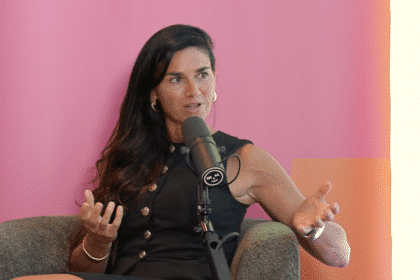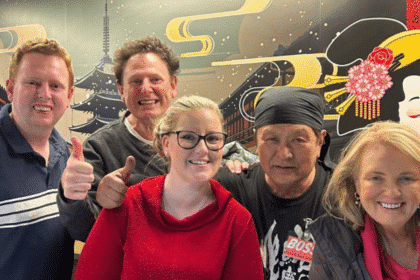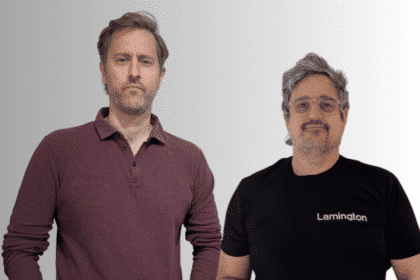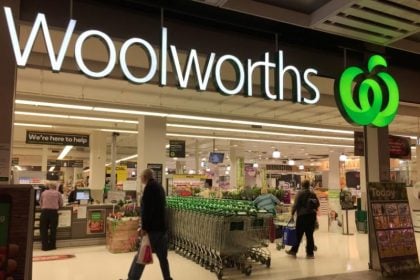They’ve got arguably the funnest and most challenging job in media. It’s Sydney morning breakfast duo 2DayFM’s Maz Compton and Dan Debuf. B&T caught-up with the pair for a chat and here’s what they had to say about all things radio…
It’s the most obvious question for any breakfast radio presenters – is it hard to be funny at 6am in the morning?
Maz) Well, we’ve got a bit of a warm-up. We actually start at 4am and the whole team is funny.
Dan) Your whole body clock changes. Like, I’m brain dead by 3.30 in the afternoon; so at six in the morning it’s big, you turn on the microphone, you’re talking to a whole city, it’s energetic, there’s so many things that you want to talk about. If anything you actually need to scale it back a bit…
Maz) ..and then you get home and you collapse in a heap.
What time do breakfast presenters go to bed at night?
M) It depends. At the moment I go to bed about nine and try and be asleep by 9.30 and then up at 3.30am.
When you got the 2DayFM gig was it a double-edged sword? The job of a lifetime but rating poorly after Kyle and Jackie O jumped to rival KIIS?
M) I feel our attitude to this job has been what a massive compliment. The support from the station; they believe that we are the show and the product that can actually do that (improve the ratings.)
D) And it’s an opportunity. That’s what got us really excited about it, it was such a great opportunity. Throughout my career I’ve always worked for stations on the rise – it’s the chance to go ‘where are we going to take this?’ If you inherit something at the top then there’ a good chance you’ll go backwards.
What’s the secret to good breakfast radio? What works and what doesn’t?
D) The secret to breakfast radio in one little sentence is that you just want it to be piss-funny and getting-up to adventures. No matter what you are doing, if people are turning it on, they’re hearing something exciting happening and the two people doing it are just bloody legends cracking people up.
How much is ad-libbed and how much is scripted?
D) It’s 100 per cent ad-libbed because there are no scripts.
M) Sure, we do live reads. If we read a script for a commercial then that’s scripted by a client or someone in sales, but I think that’s pretty obvious to the listener.
Any topics that are off limits?
M) Not that we’ve come across.
D) We recently did same-sex marriage. We had that moron on – that married guy that said he’d get divorced if same sex marriage happened. He came on the show and I just went off at him. I just could not believe what he was saying and then I realised halfway through the show that I was his worst nightmare because I believe in both same-sex marriage and dinosaurs and as a fundamental Christian I don’t think he believed in either.
Has breakfast radio become more conservative? There’s less risk taking? You stuff-up and you’re quickly savaged on social media and Twitter and the likes?
M) We go for funny. We have a lot of filters around what we want to put on a radio show every morning and that’s always been what – would make our friends piss themselves laughing? What do they want to talk about? What do they want to hear? It’s those ideas that give us the content filters. Our show is about letting people tune out, giving them a laugh.
M) There will always people who want to take you down and we do it because we love what we do and people love what we do. We do a show for our fans, for the people who want to listen to our show.
Radio is a very public medium, though. You stuff up, you fail, you don’t rate well and everybody is talking about it or reading about it somewhere?
D) I understand what you’re saying. But our show is very online, our fans live online; in terms of Twitter, Facebook, Instagram and especially Snapchat, our show goes through the roof; it’s where our people are, it’s where they’re interacting and it’s where we get our results. Because we operate in that space, the interaction we get is people who are there for us and are onboard with us
M) They’re very encouraging and positive.
D) Sure, people do write something negative things. Listeners are constantly saying to me ‘get a haircut’!
M) It’s become almost a show joke now, your hair…
D) In a way, our community who love the show, act as our moderators. I think that’s the great thing with social media is that your fans will defend you against that one person who says something negative. By and large the feedback we get online is always positive.
It’s the question everybody wants to know and it’s something you do very well – what’s the secret to marketing to Millennials?
M) Well, we’re not trying to sell anybody anything.
D) There’s no bullshit.
Well, you are trying to sell them something. You’re trying to sell them 2DayFM over KISS over NOVA over JJJ, for a start…
D) At the end we’re 100 per cent in the product. It’s about doing what we want and people are going finally someone is doing what we want to do. When you start saying ‘what do young kids want?’ that’s your own way of admitting that you’re not a young kid anymore.
M) We don’t look at it and go ‘how do we appeal to young kids?’ We just go – what do we want to do today? And people under 30 bloody love it.
Marketers would say the Ys are fickle, they’re not brand loyal, etc. We hear that sort of stuff all the time…
D) Yes they are. Ask someone under the age of 30 about their favourite footy team – they’re loyal to it. The Ys are hugely brand loyal.
Does radio still change people’s musical tastes?
D) Absolutely! Absolutely, people find out about the latest music from radio.
Do you ever play songs and think this really shit?
D) Well, we both have taste, if that’s what you’re asking? Some things I like more than others but the music we play, we’ve got some really smart people behind the scenes who manage the music we play. But there’s been times in the past when I thought are you programming out of passion? Or are you programming out of playing what’s number one and we’ll be fine?
M) We do hits and old school.
What’s the future of radio?
M) I used to produce the Merrick and Rosso show when radio was just radio, and radio hosts just did a radio show everyday. I’m now hosting a Sydney breakfast show and we’re online and we’re doing video hangouts on YouTube and we have a Snapchat account and all of our Snapchat stuff is about things that don’t happen on our radio show. We’re content creators now and that will only evolve further. It’s not just about when that microphone opens anymore. People are listening to us on so many different platforms and interacting with our show on so many different social media platforms that I now think some of our biggest fans may not be our radio audience but our social media audience now.
Has the audience become the show?
M) Going back to my Merrick and Rosso days, sure they had callers on but they couldn’t read a Twitter feed and they couldn’t get instant feedback from their audience and they couldn’t twist and turn as much as we can now.
Announcers supposedly hate them, but what’s your view of doing ad reads live?
M) Look, it’s a commercial radio station. We have clients that want us to be involved and promote what they’re doing. Sure, there are sales guys, integration people, there are a number of people who are involved in that process.
D) It’s not like the brands are just talking to us and telling us what to say but, in my opinion, a live read is a lot more powerful and important than an ad namely because it sounds like part of the show.
M) One thing I have noticed with live reads is that we get a script and it’s more bullet points than verbatim and it says ‘feel free to ad-lib’ and it feels like the clients that advertise on our show like our personalities and trust us to be creative with the key messages of that particular campaign. That’s a really nice thing to think that they trust us, they like what we’re going to spit out of our mouths.
Do you have a system in place where if one of you is going too far on-air you hit the other one with a stick or something?
M) No, not at all! When that happens I’m like keep going, keep going, keep going, keep going, keep going. We have complete faith in one another and some of the greater moments are when we just let each other go.
D) I also think what’s left unsaid is often far funnier than what you actually say.
Tips for youngsters who want to follow in your footsteps and get into radio. As an example, Dan, you come from a law background…
D) Don’t say that, that makes me sound like I was a lawyer. Sure, I’ve got a law degree but I come from a comedy background. It’s not like I was a lawyer and I took my tie off and put some headphones on. But anyone can be funny…
Does everybody have a sense of humour?
D) I’ve not met everyone yet, but I’d say the majority of people do, yes.
M) To get a job in radio, it takes a while. It’s not a job you just walk into. For me it’s been an 11-year overnight success! I think it’s really important to learn that commercial radio is a business and I think you have to learn from the ground up. I started as a producer and did a lot of different jobs in lots of different radio stations before tI got to sit behind the microphone. And I think that makes you a better broadcaster if you know how the whole thing works, all the other bits and pieces that put together this fun thing that we do every day.











